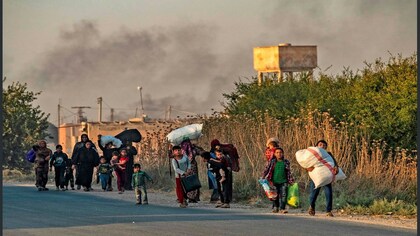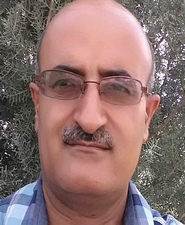Iran nuclear sanctions hurt the middle class, not Guards
15:16 - 19 November 2011

International sanctions aimed at Iran\'s nuclear program have hurt the country\'s middle class and caused factories to shut down while low-quality goods flood the country, say foreign policy analysts.
But the Islamic Revolutionary Guards Corps, the military unit that protects the Islamic regime and drives the nuclear program that sanctions are meant to impede, has profited and grown stronger under the sanctions, say the analysts.
\"People using the open banking system, average businessmen, are having a much harder time doing business,\" says Vali Nasr, an Iran expert at Tufts University in Massachusetts who served as an adviser to the State Department from 2009 to 2011. \"There is political pressure (on the Iranian regime), but it\'s not likely to change the attitude of the Iranian government on the nuclear issue.\"
The State Department regularly adds companies owned by the Revolutionary Guards to the list of sanctioned companies. But the Guards, with its network of shell companies, border outposts and foreign operations, is best positioned in Iran to dominate a sanctions economy, says Trita Parsi, president of the National Iranian American Council and author of the upcoming book A Single Roll of the Dice: Obama\'s Diplomacy With Iran, due next month. \"They are in control of most of the smuggling, and whoever is smuggling earns a profit,\" Parsi says.
The United Nations\' International Atomic Energy Agency said recently that Iran has moved closer to building a nuclear weapon. The U.S. and its allies are looking at ways to increase economic pressure on Iran to persuade it to divulge more about the program, says State Department spokesman Mark Toner. And Congress is mulling legislation to penalize foreign companies and governments that invest in Iran\'s oil and weapons firms.
Sanctions have slowed the Iranian nuclear program, impeding its access to components and nuclear materials, says David Albright of the Institute for Science and International Security, a former IAEA inspector. The IAEA report shows sanctions have not stopped Iran from maintaining \"a secret, well-structured nuclear weapons program\" since before 2004, or from establishing \"a hidden (weapons) program disguised in its civil programs,\" he says.
Iranian President Mahmoud Ahmadinejad has said Iran\'s nuclear program is for peaceful purposes and that it would continue. Yet he acknowledged the economic impact of sanctions, which he said has made it impossible to conduct certain international transactions.
Iran\'s economy could hardly withstand more pressure. Inflation was 12.4% in 2010 and unemployment was high, 14.5%, according to the International Monetary Fund.
Nasr says financial sanctions impede the flow of money in and out of Iran, making it much harder for average businessmen. Local manufacturing of consumer goods, light bulbs, screws — anything that needs a foreign component — \"are shutting down because they can\'t get raw materials,\" Nasr says. \"You cannot get a transaction through the banking system. … A lot of businesses are going under.\"
As a result, Iran is importing low-quality goods, or smuggling high-quality goods, which raises the price. The country is flooded with Chinese consumer goods, such as toothpaste, \"of much lower quality than what\'s available in the West,\" Parsi says.
Iranian Americans, many of whom travel to Iran periodically, say the sanctions are mostly hurting the Iranian middle class, small-business owners and travelers, Parsi says.
Sanctions have contributed to growing animosity between private business in Iran and the Revolutionary Guards, Parsi says. Not long ago, a successful Iranian engineering firm was approached by the Revolutionary Guards for a cut of the firm\'s profits, Parsi says. When management refused, key employees were jailed then released a few weeks later, \"meaning some sort of concession was made to the IRGC,\" Parsi says.
The Revolutionary Guards profit by taking advantage of its unique ability to get around the sanctions. An alleged Guards assassination plot against the Saudi Arabian ambassador to Washington proves the point, Parsi says. A federal affidavit said that operatives for the Guards made two wire transfers of $49,960 each to a bank in New York as payment.
Parsi says there is a strong desire among Iranians for a change in the regime.
The Guards\' economic power in Iran has grown under sanctions, but it\'s hard to quantify, says Suzanne Maloney, who worked on the State Department\'s Iran policy staff from 2005 to 2007.
Most Western oil companies were forced to leave Iran because of international sanctions, and the Guards have moved into that industry, partnering with China and others that do not abide by the sanctions, Maloney says.
By Oren Dorell, USA TODAY Updated 1d 18h ago
But the Islamic Revolutionary Guards Corps, the military unit that protects the Islamic regime and drives the nuclear program that sanctions are meant to impede, has profited and grown stronger under the sanctions, say the analysts.
\"People using the open banking system, average businessmen, are having a much harder time doing business,\" says Vali Nasr, an Iran expert at Tufts University in Massachusetts who served as an adviser to the State Department from 2009 to 2011. \"There is political pressure (on the Iranian regime), but it\'s not likely to change the attitude of the Iranian government on the nuclear issue.\"
The State Department regularly adds companies owned by the Revolutionary Guards to the list of sanctioned companies. But the Guards, with its network of shell companies, border outposts and foreign operations, is best positioned in Iran to dominate a sanctions economy, says Trita Parsi, president of the National Iranian American Council and author of the upcoming book A Single Roll of the Dice: Obama\'s Diplomacy With Iran, due next month. \"They are in control of most of the smuggling, and whoever is smuggling earns a profit,\" Parsi says.
The United Nations\' International Atomic Energy Agency said recently that Iran has moved closer to building a nuclear weapon. The U.S. and its allies are looking at ways to increase economic pressure on Iran to persuade it to divulge more about the program, says State Department spokesman Mark Toner. And Congress is mulling legislation to penalize foreign companies and governments that invest in Iran\'s oil and weapons firms.
Sanctions have slowed the Iranian nuclear program, impeding its access to components and nuclear materials, says David Albright of the Institute for Science and International Security, a former IAEA inspector. The IAEA report shows sanctions have not stopped Iran from maintaining \"a secret, well-structured nuclear weapons program\" since before 2004, or from establishing \"a hidden (weapons) program disguised in its civil programs,\" he says.
Iranian President Mahmoud Ahmadinejad has said Iran\'s nuclear program is for peaceful purposes and that it would continue. Yet he acknowledged the economic impact of sanctions, which he said has made it impossible to conduct certain international transactions.
Iran\'s economy could hardly withstand more pressure. Inflation was 12.4% in 2010 and unemployment was high, 14.5%, according to the International Monetary Fund.
Nasr says financial sanctions impede the flow of money in and out of Iran, making it much harder for average businessmen. Local manufacturing of consumer goods, light bulbs, screws — anything that needs a foreign component — \"are shutting down because they can\'t get raw materials,\" Nasr says. \"You cannot get a transaction through the banking system. … A lot of businesses are going under.\"
As a result, Iran is importing low-quality goods, or smuggling high-quality goods, which raises the price. The country is flooded with Chinese consumer goods, such as toothpaste, \"of much lower quality than what\'s available in the West,\" Parsi says.
Iranian Americans, many of whom travel to Iran periodically, say the sanctions are mostly hurting the Iranian middle class, small-business owners and travelers, Parsi says.
Sanctions have contributed to growing animosity between private business in Iran and the Revolutionary Guards, Parsi says. Not long ago, a successful Iranian engineering firm was approached by the Revolutionary Guards for a cut of the firm\'s profits, Parsi says. When management refused, key employees were jailed then released a few weeks later, \"meaning some sort of concession was made to the IRGC,\" Parsi says.
The Revolutionary Guards profit by taking advantage of its unique ability to get around the sanctions. An alleged Guards assassination plot against the Saudi Arabian ambassador to Washington proves the point, Parsi says. A federal affidavit said that operatives for the Guards made two wire transfers of $49,960 each to a bank in New York as payment.
Parsi says there is a strong desire among Iranians for a change in the regime.
The Guards\' economic power in Iran has grown under sanctions, but it\'s hard to quantify, says Suzanne Maloney, who worked on the State Department\'s Iran policy staff from 2005 to 2007.
Most Western oil companies were forced to leave Iran because of international sanctions, and the Guards have moved into that industry, partnering with China and others that do not abide by the sanctions, Maloney says.
By Oren Dorell, USA TODAY Updated 1d 18h ago



